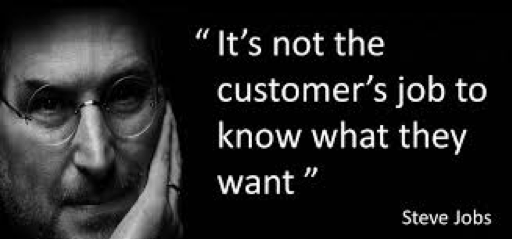The Purpose of Pure-Potential Insurance Automation is best summarized by an Insurance Journal Article written by Bill Schoeffler and Catherine Oak back in March of 2012. This article sets the direction that agencies need to adopt automation, persuasion skills, and unity within your team to influence your clients to make the right insurance decisions for themselves. Improving your service, reducing your operating costs, and making the whole process a wonderful client journey.

The Article
Steve Jobs’ primary focus was to create great products. All else was secondary. The product of an insurance agency is the service it provides to clients. The direction Steve Jobs would take would be to provide a seamless, integrated experience for the client. People have too many things to worry about and not enough time to be able to focus on their insurance needs and problem. They want to be taken care of.
Remember the time before the iPod? What was it like to go buy a stereo system? There were dozens of preamps to select, CD players to review, cassette decks to analyze, turntables to choose and speakers to complete the package. Who had time to figure out what was the best way to go?
The Steve Jobs Agency
The Steve Jobs Agency would create a system that allows the prospect to quickly discover his or her insurance needs. The key step here is to develop the technique of collecting information from the prospect and analyzing his or her insurance needs. There are tons of questionnaires that do a good job in discovering potential risk areas. Steve Jobs would develop a way to collect information quickly, painlessly and efficiently.
Once the needs were analyzed, the client would be offered a prepackaged plan with few options. The part of the plan that Steve Jobs would emphasize is not the insurance policies, but the services that the agency is providing the customer to make life easier. The agency would create emails and letters that would go out automatically over the course of the year, reminding them of the need to provide updated information and to reinforce the idea that the agency is there to support them.
One belief that Steve Jobs held was that it was important to create a product that the client did not yet know that they needed.
Steve Jobs Agency would be equally innovative. The agency would have periodic meetings with employees and key outside advisers to analyze what the agency is doing now, and 10 new ideas to focus on in the future. Steve Jobs would let the employees work on ideas to improve the product.
Another key belief Steve Jobs had was to obsess about the details. He wanted everything to be perfect, including the parts that the customer could not see. That might mean that Steve Jobs spends a lot of time developing streamlined procedures for the business. His agency would be very consistent in the product/service that the agency provides its customers.
A Single Team
The various departments in the Steve Jobs Agency would work together as a single team. Changes would only occur after getting feedback from everyone. Collaboration and integration are to be expected from employees. This is important at several levels. It allows employees to have some control over what goes on. It also creates a sense of responsibility and accountability since they were part of the decision-making process.
Steve Jobs also would employ his “reality distortion field.” He would push and challenge his employees to do their best, and more. This approach will work, however, only if the agency has all “A” players.
Steve Jobs would hire only the best. The employees would need to be passionate about providing excellent service
Steve Jobs was that once-in-a-lifetime personality that was able to change the world. He had the perfect blend of vision, drive
One of

